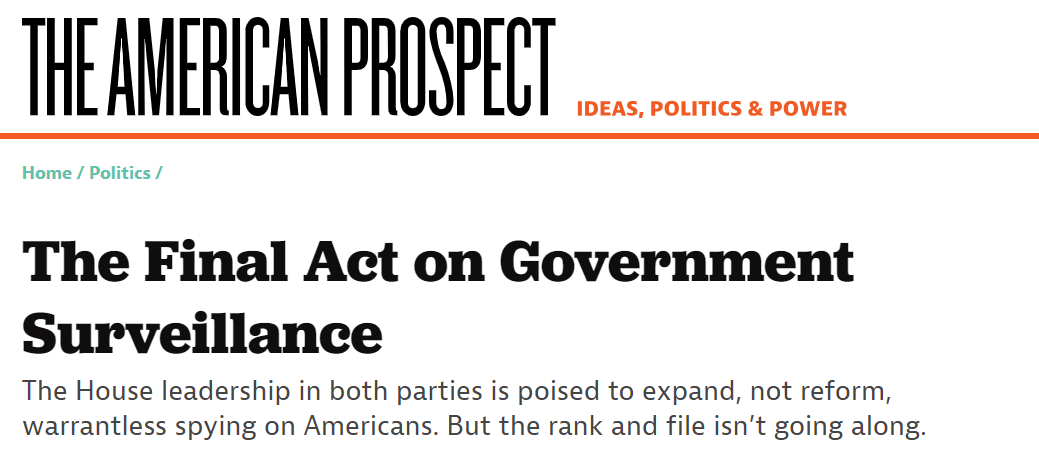Welcome to DU!
The truly grassroots left-of-center political community where regular people, not algorithms, drive the discussions and set the standards.
Join the community:
Create a free account
Support DU (and get rid of ads!):
Become a Star Member
Latest Breaking News
General Discussion
The DU Lounge
All Forums
Issue Forums
Culture Forums
Alliance Forums
Region Forums
Support Forums
Help & Search
General Discussion
Showing Original Post only (View all)The Final Act on Government Surveillance [View all]

https://prospect.org/politics/2024-04-10-final-act-government-surveillance/

A preliminary floor vote on a House rule to expand government surveillance powers, favored by leadership in both parties, failed to pass on an initial vote this afternoon. The rule was defeated by a sizable margin, 228-193, with ten members not voting. Nineteen Republicans crossed their own Speaker, voting against the rule and preventing it from coming to the floor. The fight involves whether to reauthorize Section 702 of the Foreign Intelligence Surveillance Act (FISA). House Speaker Mike Johnson (R-LA) and Minority Leader Hakeem Jeffries (D-NY) had plotted a strategy to oversee the most dramatic expansion of government surveillance powers since the original Patriot Act.
With many Republican members voting down the rule this afternoon, the path ahead to passing FISA just got a lot harder. Leadership will have to reconvene with the relevant committees to chart out a new road map. Speaker Johnson tried to load up the rule by attaching two controversial, unrelated resolutions that were added at the last minute. One denounced the Biden administration’s immigration policies and the other condemned “efforts to impose one-sided pressure on Israel with respect to Gaza.” These resolutions were likely included to try to make it more challenging for Republicans and pro-Israel Democrats to vote no, despite objections they might harbor about FISA. But the gambit did not work. “The Speaker’s thumb just broke the scale,” said Sean Vitka, policy director of Demand Progress.
Danger still lies ahead, and the stakes remain pretty high. Intelligence agencies are currently able to tap a backdoor search database of Americans’ communications without a warrant, under the guise of queries regarding a foreign threat. And under what’s known as the data broker loophole, the government can also compel certain types of companies to hand over data collected on Americans. In each instance, the House Intelligence Committee is now pushing for broader legal criteria authorizing this surveillance. Reform advocates have referred to the Intel Committee’s amendments as “Patriot Act 2.0.” One Intel Committee amendment would expand the already broad definition of foreign intelligence in FISA to specifically include any information about international trafficking, sale, and production of narcotics driving “overdose deaths,” which could cover any drug under the Controlled Substances Act.

Another amendment targets immigrants traveling to the U.S. by allowing intelligence agencies to run backdoor searches on these groups without providing any rationale, which is the only restriction on these powers when applied to Americans. “As if the base text wasn’t bad enough, these amendments would all significantly expand Section 702. In particular, the weaponization of a post-9/11 warrantless surveillance authority to search for immigrants traveling to the U.S.—with no suspicion of wrongdoing whatsoever—is deeply offensive and should be radioactive,” Chris Baumohl, law fellow at the Electronic Privacy Information Center (EPIC), told the Prospect. House Intelligence Committee leaders are pushing for even more drastic changes by dropping key qualifications on which types of businesses are subject to Section 702 information requests. The government could now compel companies as far-reaching as office buildings, landlords, and even the backbone of the internet such as data centers, according to FISA Court amicus lawyer Marc Zwillinger. Access to data centers would constitute a massive expansion of “upstream” government surveillance, Zwillinger suggested.
snip
InfoView thread info, including edit history
TrashPut this thread in your Trash Can (My DU » Trash Can)
BookmarkAdd this thread to your Bookmarks (My DU » Bookmarks)
4 replies, 371 views
ShareGet links to this post and/or share on social media
AlertAlert this post for a rule violation
PowersThere are no powers you can use on this post
EditCannot edit other people's posts
ReplyReply to this post
EditCannot edit other people's posts
Rec (5)
ReplyReply to this post
4 replies
 = new reply since forum marked as read
Highlight:
NoneDon't highlight anything
5 newestHighlight 5 most recent replies
= new reply since forum marked as read
Highlight:
NoneDon't highlight anything
5 newestHighlight 5 most recent replies